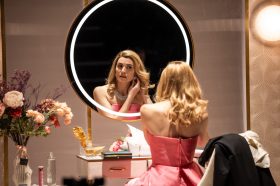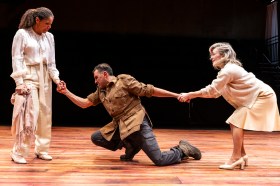The Adelaide Symphony Orchestra (ASO) has enjoyed a wonderful series of concerts featuring the three dramatic Symphonies by Russian composer Sergei Rachmaninov. These concerts built on the success of last year’s series of three Rachmaninov piano concertos. And again, the ASO welcomed US conductor and concert pianist Andrew Litton to lead them in these works. Each performance featured a selection of works before the interval with the headline Symphony filling out the second half.
Introducing the first concert ahead of its broadcast on ABC Classic FM, presenter Russell Torrance spoke about the Adelaide Town Hall, ‘a grand sandstone building with a clock tower’. As he said, ‘The performance space is on the first floor, so to get there you go up this huge marble staircase. It makes you want to do a Fred Astaire up and down it with a top hat. And the performance room itself has columns, gilded panels, chandeliers and that magnificent organ.’
The concert opened with Ecologue, a pastoral piece by English composer Gerald Finzi. This melodic and expressive work for piano and strings evokes country lanes and quant villages, but with a brooding undertone. Conductor Andrew Litton led from the piano, which was positioned in a jaunty angle at the front of the stage.
This was followed by one of music’s most loved pieces, the timeless Rhapsody in Blue by George Gershwin. It’s a testament to its universal appeal that it still tops music charts in this the 100th anniversary year of its first performance in 1924. Litton is an acknowledged Gershwin master and is an adviser to the Gershwin Archives at the University of Michigan, so we were in good hands.
He told the audience he was born just two blocks from the house where the Gershwins lived, so it must have been in the stars that he became an aficionado. This was the well-known 1942 version arranged for a full orchestra by Ferde Grofé.
After interval, it was into the main event, Rachmaninov’s dark and demanding Symphony No. 1 in D Minor, written when he was just 23 years old. The premiere performance of this work, back in 1897, was a disaster of such magnitude that Rachmaninov basically disowned it. Thankfully, it was rediscovered in 1945, after the composer’s death and is now an established part of the concert repertoire.
Litton gave an earthy and robust reading of the score and highlighted the strains of the Roman Catholic ‘Mass of the Dead’ theme. Together, these three works made an eclectic and interesting program, but it was difficult to see (or hear) any real musical connection between them.
The Second is the best known and most frequently performed of the Rachmaninov symphonies and this performance didn’t disappoint the audience. It was written more than a decade after that ill-fated First Symphony, with the composer himself conducting the premiere performance in St Petersburg in 1908.
And here, under Litton’s vigorous conducting, the piece sounded new, fresh and vital, although admittedly a little different to the usual renditions. The players of the ASO embraced the challenge, giving a vivid performance with great rolling waves of sound. At some 60 minutes in length, and full of extraordinarily complex passages, it was fascinating to watch Litton conduct with no score.
The concert opened with a work by another Sergei, the wonderful Piano Concerto No. 3 by Prokofiev. This is renowned for its musical fireworks and intense demands on the pianist; it’s also a work that soloist Konstantin Shamray knows and loves. And the Adelaide audience loves Shamray too, always showing their deep appreciation of his virtuosic pianism and no nonsense approach. Dean Newcomb, the ASO’s talented principal clarinet, was central to evoking the tone and feeling of the piece.
The third and final concert in the series featured works by Aaron Copland and Samuel Barber ahead of the Rachmaninov Symphony No. 3 in A Minor. Originally written to accompany a ballet by choreographer Martha Graham, Copland’s ‘Appalachian Spring’, has undergone numerous arrangements and orchestrations. This is a highly evocative work that creates an unmistakably nostalgic sense of Americana. The colourful soundscape takes us back to traditional movie music and the themes to old cowboy shows. From its gentle opening, including lovely work for the harp, to its reflective close, the music takes you on a journey through the Appalachian region.
After some rearrangement of the stage, the ASO’s Artist in Association, violinist Emily Sun joined the orchestra for Barber’s Violin Concerto, a work that has also been adapted for a ballet. Sun’s close relationship with the ASO was evident in every moment as they worked seamlessly together. The oboe solo in the second movement was played with real feeling and added to the emotional depth of the piece. As always, Sun received very warm applause, and much appreciative foot-stamping, from both the audience and the players for her magnificent playing. After interval, she crept into the dress circle carrying her precious instrument to see the performance of the mighty Rach 3.
Like the First, this too received some criticism when it was first performed. Some critics and musicologists damned it as being too modern; for others, it was too conservative, not fulfilling their expectations of something new and daring. There is certainly a lot going on in this work of melancholic modernity, with a haunting opening, horns and clarinets, a celesta and a harp, and a deeply expressive score that somehow feels profound.
Read: Musical review: Beauty and the Beast the Musical, Her Majesty’s Theatre
After a full 40 minutes, the dramatic finale had maestro Litton literally leaping into the air as he brought the work, and the series, to a fiery close. On this cold night in Adelaide, it felt just right and the passionate playing of everyone on stage made this a remarkable performance and a memorable concert series.
Rachmaninov: The Symphonies
Adelaide Town Hall
Adelaide Symphony Orchestra
Conductor and piano: Andrew Litton
Featuring Emily Sun
Rachmaninov: The Symphonies was performed for one night only on 29 June 2024.





